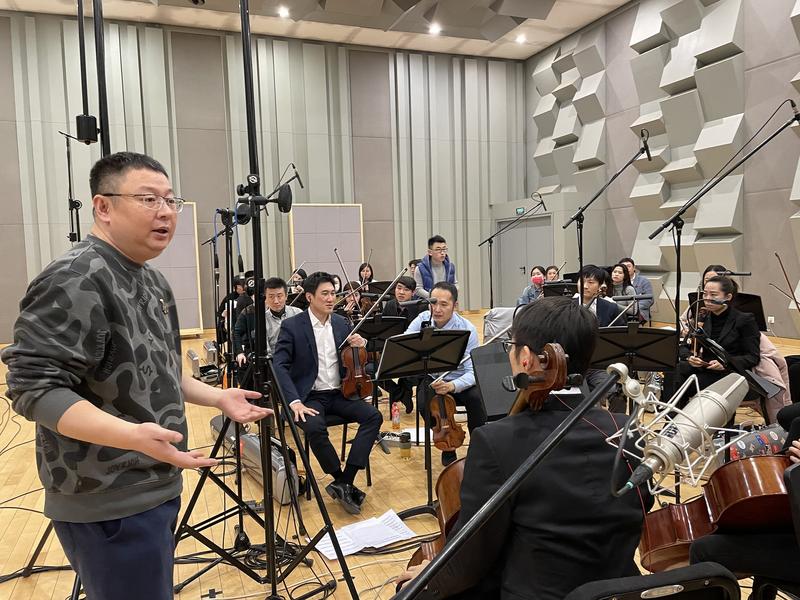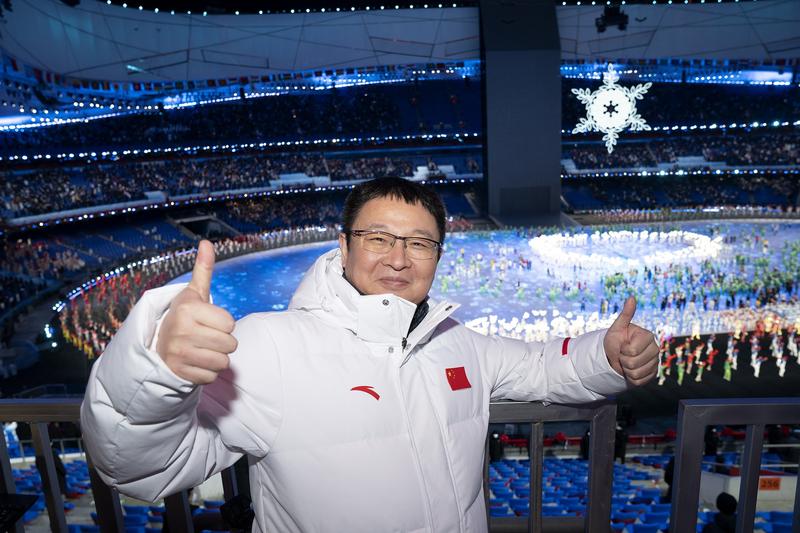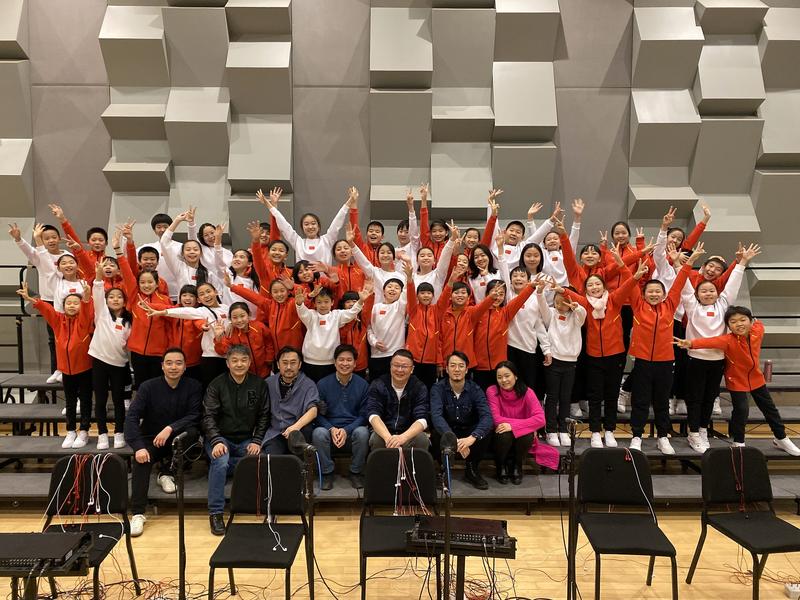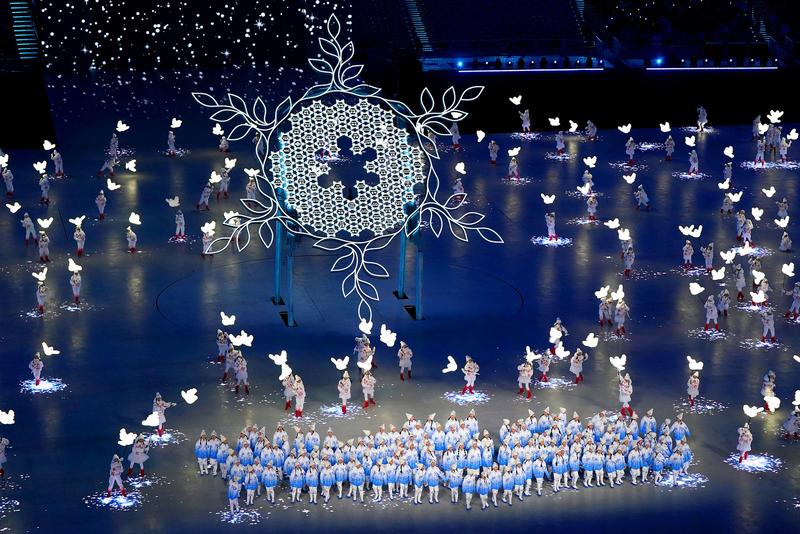Composers, conductors and other musicians took more than two years to prepare for the opening ceremony of the 2022 Beijing Winter Games, Chen Nan reports.
 Composer Zhao Lin and musicians of the China NCPA Orchestra prepare to record music for the opening ceremony of the Winter Games. (PHOTO PROVIDED TO CHINA DAILY)
Composer Zhao Lin and musicians of the China NCPA Orchestra prepare to record music for the opening ceremony of the Winter Games. (PHOTO PROVIDED TO CHINA DAILY)
In 2019, when composer Zhao Lin was invited by renowned film director Zhang Yimou to be the music director of the 2022 Beijing Winter Olympics opening ceremony, he began by doing research about musical pieces played during the parade of athletes in past Summer and Winter Games and the Paralympics.
"The parade of athletes into the stadiums usually takes about an hour, which is a very long and important part of the opening ceremony. We want to welcome those athletes with music that can resonate with them," says Zhao.
We want to celebrate these athletes who have overcome many difficulties to gather in Beijing. The music pieces we selected share an uplifting melody, bringing hope and joy.
Zhao Lin, music director of the 2022 Beijing Winter Olympics opening ceremony
He came up with the idea of using world-renowned classical music pieces during the ceremony, and says, "like sports, classical music is a mutual language of all people".
"We want to celebrate these athletes who have overcome many difficulties to gather in Beijing. The music pieces we selected share an uplifting melody, bringing hope and joy," Zhao adds. "Whether you are a fan of classical music works or not, you may have listened to the pieces in your daily lives. These music works connect with people from around the world."
When the 2022 Winter Games opening ceremony was held at the National Stadium in Beijing on Feb 4, athletes from 91 countries and regions marched into the stadium accompanied by 18 classical music pieces, including William Tell Overture by Italian composer Gioachino Rossini, The March from The Nutcracker by Russian composer Pyotr Ilyich Tchaikovsky, The Turkish March by German composer Ludwig van Beethoven, and Carmen Prelude Act 1 by French composer Georges Bizet.
To add a sense of diversity to the song list, Zhao also used smooth dance music in the form of waltz, such as The Waltz of the Flowers from the second act of The Nutcracker, and Voice of Spring by Austrian composer Johann Strauss II.
The music was warmly received by audiences who shared their appreciation on social media. Some described the pieces as capturing a wide range of emotions, which fitted well with the parade, and the others shared the names of the music pieces online, allowing more people to enjoy them afterwards.
 Zhao at the spectacular opening ceremony. (PHOTO PROVIDED TO CHINA DAILY)
Zhao at the spectacular opening ceremony. (PHOTO PROVIDED TO CHINA DAILY)
When China's athletes marched into the stadium, the parade culminated with Ode to My Motherland, a household song in the country, written by Wang Xin and published in 1951.
According to Zhao, the 18 classical music works were decided after rounds of voting from Chinese conductors, months before the opening ceremony. Each of the conductors sent Zhao a list of 20 songs before the voting started.
To make the musical works fit into the tempo of the parade, Zhao also invited 11 Chinese composers, mainly people born after 1990 and 1980, to rearrange the pieces. The final step was having the China NCPA Orchestra and principal players from Chinese symphony orchestras record the musical works.
"We made changes all the time to achieve the perfect sounds for the parade of athletes, even during rehearsals. The conductors and composers stayed online, working day and night," Zhao says. "It's been over two years preparing for the big occasion. It was definitely a memorable experience and all the musicians felt exhilarated and greatly honored to be able to contribute to the spectacular event, where music met sports."
 Children from the Beijing Philharmonic Choir, who performed the theme song, Snowflake, for the ceremony, celebrate with musicians, including Zhao Lin, conductor Yang Li and songwriter Zhang Shuai. (PHOTO PROVIDED TO CHINA DAILY)
Children from the Beijing Philharmonic Choir, who performed the theme song, Snowflake, for the ceremony, celebrate with musicians, including Zhao Lin, conductor Yang Li and songwriter Zhang Shuai. (PHOTO PROVIDED TO CHINA DAILY)
Born in Xi'an, Shaanxi province, Zhao, 49, began to learn the piano at the age of 5 and studied as a composer at the Central Conservatory of Music in Beijing, where he graduated in 1996. He began his professional career as a composer for the China National Traditional Orchestra. He has been working with his father, Zhao Jiping, a composer known for scores in Zhang's film Raise the Red Lantern and director Chen Kaige's film Farewell My Concubine. Following in his father's footsteps, Zhao Lin has also produced film scores, including those for Together, directed by Chen, and A Woman, a Gun and a Noodle Shop, directed by Zhang.
In 2004, Zhao Lin also composed for the Silkroad Ensemble, a world-music initiative overseen by cellist Yo-Yo Ma.
Other music highlights during the opening ceremony included a student chorus from Fuping, Hebei province, singing the Olympic anthem in Greek, and a child trumpeter playing the melody of Me and My Motherland, also a household song in China.
 Children perform during the opening ceremony of the Winter Games at the National Stadium in Beijing on Feb 4. (PHOTO / PA IMAGES)
Children perform during the opening ceremony of the Winter Games at the National Stadium in Beijing on Feb 4. (PHOTO / PA IMAGES)
Unlike the theme song of the 2008 Summer Games in Beijing, You and Me, which was performed by Chinese pop star Liu Huan and British soprano Sarah Brightman, the theme song for the opening ceremony of 2022 Winter Games, titled Snowflake, was performed by about 140 children, between ages 7 and 12.The children are from the Beijing Philharmonic Choir, which was founded in 1983 by music educator Yang Hongnian (1934-2020).
According to Yang Li, president and principal conductor of the Beijing Philharmonic Choir, and son of Yang Hongnian, the choir also performed at the opening ceremony of the 2008 Summer Games.
"Children represent the future. Their voices are pure and innocent, just like snowflakes, and crystal clear," says Zhao Lin, adding that the song was chosen from over 40 songs written by Chinese songwriters.
Contact the writer at chennan@chinadaily.com.cn


